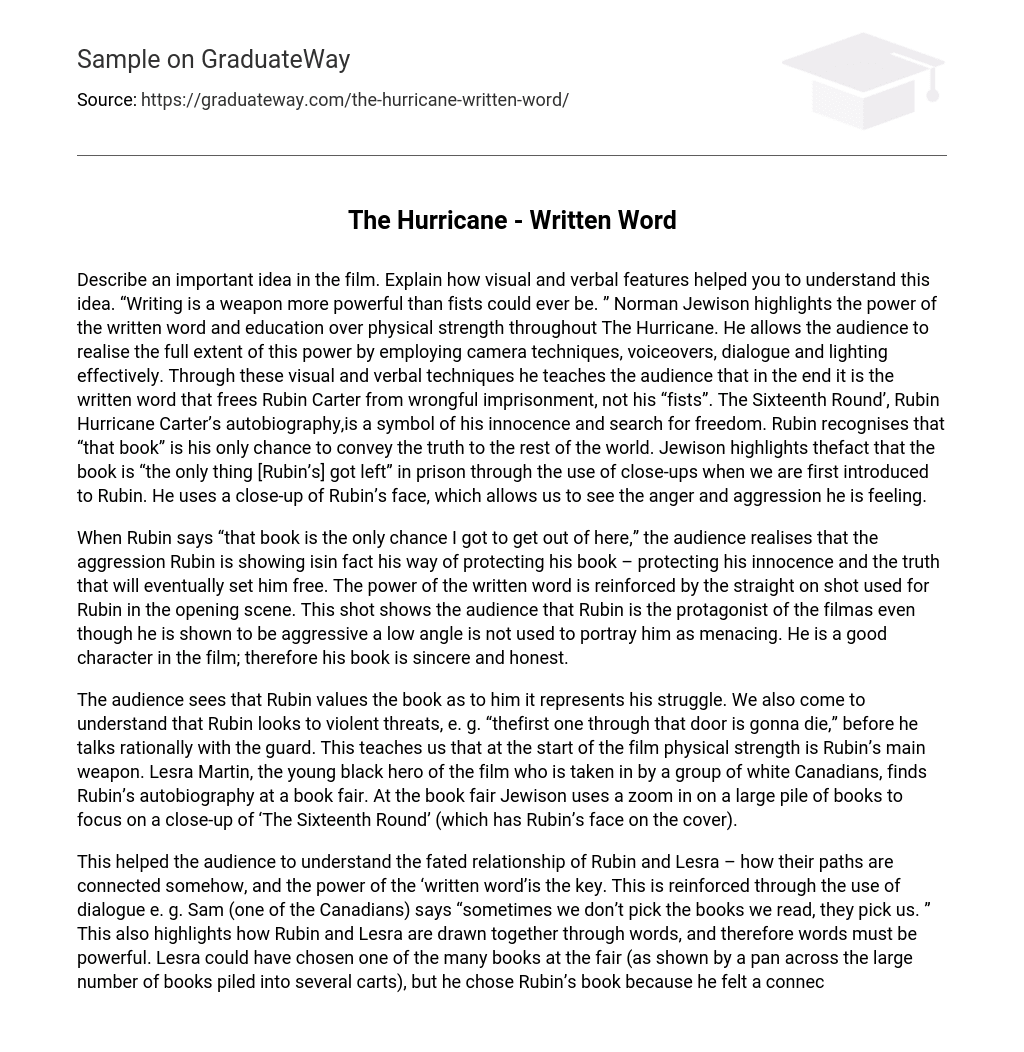Norman Jewison effectively demonstrates the power of the written word and education over physical strength in The Hurricane. Using camera techniques, voiceovers, dialogue, and lighting, he highlights the idea that writing is a stronger weapon than fists. The film emphasizes that it is through the written word that Rubin Carter ultimately attains freedom from wrongful imprisonment. Rubin’s autobiography, ‘The Sixteenth Round’, becomes a symbol of his innocence and desire for freedom. In prison, Rubin recognizes that this book is his only means of conveying the truth to the world. Jewison portrays this by employing close-up shots of Rubin’s face, revealing his anger and aggression, and emphasizing that the book is all he has left in prison.
Rubin’s statement that “that book is the only chance I got to get out of here” reveals that his aggression is simply a means of safeguarding his book, which represents his innocence and the truth that will ultimately grant him freedom. The use of a straight on shot in the opening scene emphasizes the power of the written word, establishing Rubin as the protagonist without depicting him as menacing through a low angle. As a character of virtue in the film, Rubin’s book is characterized as genuine and truthful.
Rubin’s appreciation for the book is evident to the audience as it symbolizes his personal struggle. Additionally, we learn that before engaging in rational conversation with the guard, Rubin resorts to violent threats such as “thefirst one through that door is gonna die.” This indicates that physical strength serves as Rubin’s primary weapon at the beginning of the film. The young black protagonist, Lesra Martin, who is welcomed by a group of white Canadians, discovers Rubin’s autobiography at a book fair. During this event, Jewison utilizes a zoom-in technique on a large stack of books to draw attention to a close-up of ‘The Sixteenth Round,’ which prominently features Rubin’s face on its cover.
The audience gains an understanding of the interconnectedness of Rubin and Lesra’s destinies, as well as the power of literature, in this scene. Dialogue, such as Sam’s remark that books have the ability to choose us, further underscores how Rubin and Lesra are brought together through words and emphasizes the potency of language. Despite the numerous options available at the book fair (as seen in the piled carts), Lesra specifically selects Rubin’s book due to a personal connection he feels. Lesra is captivated by ‘The Sixteenth Round’ andexpresses, “I can’t stop reading man, this book’s about my life.” Through Lesra’s enthralled response, the audience witnesses how the written word can inspire him and instill the confidence to transform his own life positively. Jewison employs Rubin Carter’s voiceover while Lesra is reading and seamlessly transitions from Lesra’s reading to an event within the book using a fade-in effect. These cinematic techniques foster a connection between the two characters through their shared experience with the written word.
The usage of voiceover and fade in indicates Lesra’s deep involvement in Rubin’s story and his determination to assist him. This book inspires Lesra to establish communication with Rubin, accomplished by exchanging letters. The close-up shot of Lesra’s trembling handwriting symbolizes his remarkable progress from illiteracy to composing a complete letter. The power of the written word, exemplified by handwritten correspondence, nurtures a profound bond between Rubin and Lesra. It is this relationship that ultimately grants Rubin the long-awaited freedom he had been denied for countless years.
At first, Rubin believed that his only means of achieving freedom was by fighting his way out of prison. He had made the decision to transform his body into a tool that would eventually secure his liberation. These sentiments are depicted to the viewers through a sequence at the start of the film, wherein various shots of Rubin developing his physical strength are edited together. Simultaneously, a voiceover of Rubin can be heard, saying, “I spoke hate. And its verbs were fists.” This conveys to the audience that Rubin harbored intense anger towards the injustices he had endured and relied on his physical prowess, specifically his fists, as a solution.
As the film progresses, Rubin goes through a transformation and becomes a “warrior scholar.” He realizes the importance of education over physical strength and shares this message with Lesra by stating, “writing is a more powerful weapon than fists will ever be.” The audience witnesses this change through the use of lighting. As Rubin transitions from being violent and aggressive to valuing education, the lighting in his cell shifts from being dark and gloomy to warm and glowing. This shift in lighting also symbolizes to the audience that as Rubin turns away from violence and embraces education and words as a solution, hope and love return to his life.
Rubin’s desire to overcome his difficulties through physical confrontation has changed. The transformation is evident in Lesra, who is determined to break the cycle of poverty that ensnares his family through education. A comparison can be made between the young Rubin, who resorts to physical fighting to combat injustice, and Lesra, who employs his education as a means to fight against injustice. Ultimately, it is the power of written words that liberates Rubin, surpassing physical strength. Lesra and the unwavering dedication of the Canadians enable Rubin to construct a strong legal argument supporting his innocence.
By highlighting the power of words, the film emphasizes their role in uniting Rubin and Lesra, and ultimately in liberating Rubin. The use of various cinematic techniques, such as camera techniques, dialogue, voiceovers, and lighting, helped the audience grasp the significance of words in enabling Rubin to attain justice and Lesra to break free from his impoverished hometown. Through exchanging written correspondence, Rubin developed a paternal affection for Lesra, enabling him to transcend the hatred in his life and achieve true freedom. As Rubin eloquently puts it, “Hate put me in prison and love’s gonna bust me out.”





